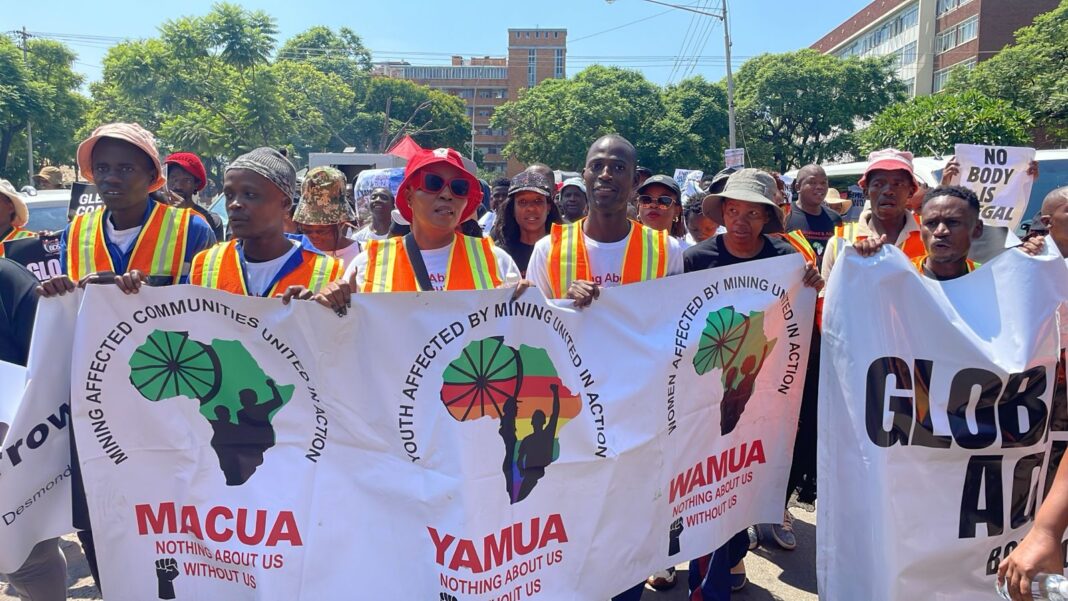Johnathan Paoli
Despite the promises embedded in South Africa’s Mineral and Petroleum Resources Development Act (MPRDA) of 2002, aimed at ensuring equitable access to mineral resources and socio-economic benefits, affected communities argue that the legislation has failed to protect their rights and promote meaningful development.
This emerged on Tuesday at the summit organized by Mining Affected Communities United in Action (MACUA) and Women Affected by Mining United in Action (WAMUA), which took place from February 4 to 6, 2025, at the Holiday Inn in Sunnyside Park, Johannesburg.
The summit, held under the theme “Our Land, Our Rights, Our Future: Laws for People and the Planet, Not for Mining,” brought together a diverse group of experts and activists.
Attendees included representatives from Youth Affected by Mining United in Action, Women Affected by Mining United in Action, Lawyers for Human Rights, and the Centre for Environmental Rights, along with academics from Wits University and mining community activists from across the country.
The summit focused on issues affecting communities in various municipalities in South Africa such as Bapong, Mogalakwena, Gamagara, Ga-Segonyana, Lephalale, Matjhabeng, and Rustenburg, which represent major mining sectors – iron ore, manganese, coal, gold, and platinum.
According to activists and community representatives attending the summit, companies control land, housing, services, and local governance, exerting significant influence over economic and social life.
During a panel discussion on the limitations of the MPRDA, MACUA Legal Head Phyllia Ngoatje highlighted its broad scope but noted significant gaps in ensuring effective development for mining-area communities.
“There remains a legislative void in how the extractive industry operates, benefits communities, and ensures accountability and protection for affected populations,” Ngoatje said.
Panelists said that for over two decades, communities near mining sites have faced various challenges: lack of transparency, limited involvement in decision-making, ineffective development projects, non-compliance by mining companies, and inadequate investment in community development.
These concerns were echoed powerfully during the summit, underscoring how both government entities and private mining corporations perpetuate social, environmental, and economic injustices.
The dual role of the state as both regulator and beneficiary of mining activities creates inherent conflicts of interest, the summit heard.
Heavy reliance on mining revenue often leads to prioritisation of economic gains over the well-being of local populations and environmental sustainability.
This economic dependency results in policies that favor mining companies, leaving communities marginalized and voiceless.
The summit also heard that private mining companies exploit these regulatory weaknesses through divide-and-rule tactics, fostering divisions within communities to weaken opposition to their projects.
MACUA emphasised the need to explicitly define Social Labour Plans (SLPs) within the legislation, focusing on employment creation, socio-economic development, and transformation.
The proposed amendments include:
- – Public participation, by ensuring meaningful consultations with communities, employees, and other stakeholders in the development and review of SLPs.
- – Transparency, by requiring mining companies to publish approved SLPs, compliance reports, and other relevant documents.
- – Financial provisions, through establishing a minimum spending formula tied to company turnover for community development projects.
- – Compliance and enforcement, by strengthening mechanisms to ensure that mining companies adhere to their commitments; and transitional provisions which allow for a two-year period for existing mining operations to align with the new requirements.
The summit also underscored the importance of Free, Prior, and Informed Consent (FPIC) as a cornerstone of equitable mining governance.
Communities must have the right to approve or reject mining projects, with access to complete information about potential impacts.
Recent court rulings, such as the landmark Xolobeni case, have highlighted the necessity of respecting customary land rights and ensuring meaningful consultation processes.
In 2017, a High-Level Panel led by former President Kgalema Motlanthe released a report criticising the MPRDA for perpetuating inequality and failing to protect the rights of mining-affected communities.
The report recommended several key reforms, including protection of vulnerable groups by ensuring meaningful protections and obtaining genuine consent from affected communities.
Additionally the report called for establishing clear compensation mechanisms and ensuring transparent, equitable distribution of mining revenues as well as introducing binding protocols for transparency and accountability in dealings between companies and communities.
The report mandated adherence to the Interim Protection of Informal Land Rights Act for all new mining applications.
INSIDE METROS

